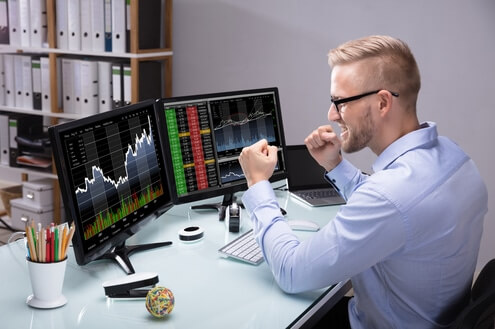The Forex Puzzle: Unraveling Broker Trading Success
In the fast-paced world of Forex trading, success often seems like an elusive puzzle waiting to be solved. As traders navigate through the complexities of the foreign exchange market, the role of brokers becomes paramount. This article aims to dissect the various elements contributing to broker trading success, providing insights and strategies for traders to enhance their proficiency.
Definition of Forex Trading
Forex, short for foreign exchange, involves the buying and selling of currencies in the global market. It is the largest and most liquid financial market globally, with a daily turnover exceeding trillions of dollars.
Significance of Broker Trading Success
Brokers play a pivotal role in facilitating Forex transactions. Understanding the nuances of broker trading success is essential for traders aiming to thrive in this dynamic environment.
Understanding Forex Brokers
Role of Forex Brokers
Forex brokers act as intermediaries, connecting retail traders with the interbank forex market. They provide trading platforms, market analysis tools, and leverage to enhance traders’ capabilities.
Factors to Consider When Choosing a Broker
Selecting the right broker is crucial for trading success. Factors such as regulatory compliance, transaction costs, and available trading instruments should be carefully evaluated.
The Puzzle of Trading Success
The Myth of Overnight Success
Contrary to popular belief, success in Forex trading is rarely instantaneous. Traders must dispel the myth of overnight success and focus on continuous improvement.
Importance of Skill Development
Successful trading requires a honed skill set. Technical analysis, fundamental analysis, and risk management are integral components that traders must master.
Emotional Intelligence in Trading
Emotional intelligence is often underestimated in trading. Controlling emotions, especially fear and greed, is crucial for making rational decisions in the volatile forex market.
Key Elements of Broker Trading Success
Market Analysis Techniques
Traders need a robust understanding of market analysis techniques, including chart patterns, indicators, and economic indicators.
Risk Management Strategies
Effective risk management is vital to protect capital. Traders must set stop-loss orders, diversify their portfolios, and avoid over-leveraging.
Trading Psychology
Psychological resilience is a key component of successful trading. Traders need the discipline to stick to their strategies and learn from both successes and failures.
Tools and Technologies
Leveraging Trading Platforms
Modern trading platforms offer a plethora of features, from real-time charts to automated trading. Traders should leverage these tools to enhance their decision-making processes.
Automation in Trading
Algorithmic trading, or “algo trading,” automates the execution of trading strategies. Traders can use algorithms to execute trades at optimal conditions, minimizing human errors.
Big Data and Analytics
Big data analytics provide valuable insights into market trends and patterns. Traders can use data-driven approaches to refine their strategies and make informed decisions.
Navigating Market Volatility
Adapting to Changing Market Conditions
The forex market is inherently volatile. Traders must develop adaptive strategies to thrive in changing market conditions.
Strategies for Volatile Markets
During periods of high volatility, traders can employ specific strategies such as trend following or countertrend trading to capitalize on market movements.
Learning from Mistakes
Embracing Failure as a Learning Opportunity
Failure is inevitable in trading. Successful traders view losses as opportunities to learn and improve their strategies.
Common Pitfalls to Avoid
Understanding common trading pitfalls, such as impulsive decision-making and overtrading, is essential for avoiding unnecessary losses.
The Role of Education in Trading Success
Continuous Learning and Skill Enhancement
The forex market evolves, and successful traders commit to continuous learning. Staying updated on market trends and refining skills is paramount.
Resources for Aspiring Traders
Numerous educational resources, including online courses and forums, provide aspiring traders with the knowledge and support needed for success.
Psychological Resilience in Trading
Dealing with Losses
Losses are an inherent part of trading. Developing resilience and a healthy mindset enables traders to bounce back from setbacks.
Maintaining Discipline in Trading
Discipline is the bedrock of successful trading. Traders must adhere to their strategies and resist emotional impulses.
The Importance of Networking
Building a Trading Community
Connecting with other traders fosters a sense of community. Traders can share insights, strategies, and support one another.
Learning from Peers
Networking provides the opportunity to learn from others’ experiences, gaining new perspectives and refining one’s approach to trading.
Regulatory Considerations
Understanding Forex Regulations
Choosing a regulated broker ensures a level of transparency and security for traders. Understanding regulatory frameworks is crucial for making informed choices.
Choosing Regulated Brokers
Traders should prioritize brokers regulated by reputable financial authorities to mitigate the risk of fraud and malpractices.
The Future of Forex Trading

Emerging Trends in Forex
Technological advancements, changing market dynamics, and global events contribute to emerging trends in forex trading.
Technological Advancements in Trading
Blockchain technology, artificial intelligence, and machine learning are reshaping the landscape of forex trading, providing new opportunities and challenges.
Conclusion
Recap of Key Points
Successful forex trading is a multifaceted puzzle that requires a combination of skills, strategies, and emotional intelligence.
Encouragement for Aspiring Traders
Aspiring traders should approach the forex market with dedication, a commitment to learning, and a willingness to adapt to the ever-changing landscape.
FAQs :
- What is the significance of choosing a regulated forex broker?
A regulated broker provides a level of transparency and security for traders, reducing the risk of fraud and malpractices.
- How can traders navigate volatile market conditions?
Traders can employ adaptive strategies, such as trend following or countertrend trading, to capitalize on market movements during periods of high volatility.
- Why is continuous learning important in forex trading?
The forex market evolves, and continuous learning allows traders to stay updated on market trends and refine their skills for ongoing success.
- How can traders develop emotional resilience in trading?
Dealing with losses, maintaining discipline, and controlling emotions are key components of developing emotional resilience in trading.
- What are the emerging trends in forex trading?
Emerging trends include the adoption of blockchain technology, artificial intelligence, and machine learning, which are reshaping the forex trading landscape.






